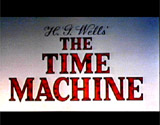
|
The Time Machine (1960)
In producer/director George Pal's and MGM's science
fiction classic, based upon H.G. Wells' 1895 novel 'The Time Machine',
about travel across vast amounts of time and space; it told about
an inventor in Victorian-Era England who constructed a time machine
to enable him to travel forward in time (in the 4th dimension) to
the year 802,701, where he discovered a dystopian future caused by
an earlier nuclear holocaust. Mankind had been divided into two groups
- the passive, vegetarian, childlike, illiterate and carefree Eloi
and the monstrous underground-dwelling, cannibalistic mutants known
as Morlocks who controlled society.
The film, shot with Metrocolor, won the Oscar for Best
Special Effects (its sole nomination), competing against only one
other film The Last Voyage (1960), a disaster film starring
Robert Stack about the fifth and last voyage of the aging SS Claridon
en route to Japan across the Pacific. The most exceptional scenes
in the film were the amazing time-lapse photography (also with stop-motion
animation and traveling mattes) employed in the scenes of fast-forward
travel in the 'time machine.' The film's tagline advertised: "You
Will ORBIT Into the Fantastic Future!" Its budget of $850,000
was spread out and used for many fantastic effects in its depiction
of centuries of time, including Victorian England at the
turn of the century, three World Wars (with the Blitz, nuclear explosions
and lava flow), and a post-apocalyptic future with underground caverns
and frightening creatures.
It was suave and handsome Australian actor Rod Taylor's
first starring role in a major film as the time-traveling character
of "George" (there was no last name heard in
the dialogue, although he definitely represented H.G. Wells, whose
name appeared on a control-panel name-plate of the machine itself),
after appearing in minor roles in 50's films, including Giant
(1956), Raintree County (1957), and Separate Tables (1958).
Director Pal in the 1950s had been a producer of other
sci-fi films, including Destination Moon (1950), When Worlds
Collide (1951), H.G. Wells' The War of the Worlds (1953),
The Naked Jungle (1954), and Conquest of Space (1955).
Hal's first directed feature was MGM's Tom Thumb (1958).
This influential time travel film was followed by
another Wells' inspired movie - Nicholas Meyer's remake Time After
Time (1979),
starring Malcolm McDowell and Mary Steenbergen that was set in both
1893's London and 1979's San Francisco, in pursuit of serial killer
'Jack the Ripper'. It was also remade as The
Time Machine (2002),
a loose adaptation directed by H.G. Wells' great-grandson Simon Wells,
starring Guy Pearce. In the 2002 iteration, it was set in New York,
and the main character's name was Alexander.
- in the opening pre-titles sequence, against a black
background, various time-keeping devices floated or drifted across
the screen -- an ancient rock sundial on a pedestal, an antique
hourglass with sand, a Greek water clock, a rotating clock with
three golden cherubs reaching up to chimes, two loudly-ticking
squarish clocks or timepieces, a grandfather clock in a wooden
frame, and additional timekeeping mechanisms, ending with Big Ben
in London chiming on the half-hour
- in the first scene on a snowy, wintry night on January
5, 1900, four gentlemen met at 8 pm at the London residence of their
friend, scientist and inventor "George" (Rod Taylor); they had
met five days earlier on December 31, 1899, and were reinvited
back for dinner; the four guests were greeted by housekeeper Mrs.
Watchett (Doris Lloyd); the guests assembled in the library, lined
with timepieces of all kinds, included red-haired scientist and
best friend David Filby (Alan Young), hefty bearded businessman
Dr. Philip Hillyer (Sebastian Cabot), cultured Anthony Bridewell
(Tom Helmore), and Walter Kemp (Whit Bissell), awaiting the conspicuously-absent
host "George"
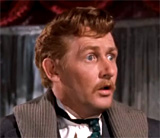
David Filby (Alan Young)
|
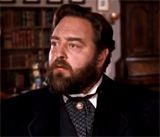
Dr. Philip Hillyer (Sebastian Cabot)
|
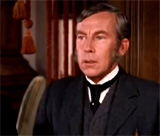
Walter Kemp (Whit Bissell)
|
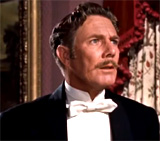
Anthony Bridewell (Tom Helmore)
|
- the host, known as the "Time Traveler" in the script,
arrived late - appearing in the dining room doorway, disheveled,
exhausted, with a torn shirt and dirt on his face; he began an
explanation of what had happened to him, with a flashback to their
earlier dinner meeting five days earlier
- at that time during another
dinner get-together in his home, the traveler spoke of the possibility
of movement within the 4th Dimension - Time ("The fourth dimension
cannot be seen or felt"); he explained: "But
when it comes to Time, we are prisoners"; he then unveiled from
a box an invention that had been two years in the making - a miniature
time machine - a "small experimental model"; he added: "To
carry a man, a larger edition is needed" - to journey through
time to either the past or the future; George pondered to himself: "Can
man control his destiny? Can he change the shape of things to come?"
- when he activated the small-scale model (with a
cigar impersonating an individual seated on it) by pushing a tiny
lever on the front control panel, it disappeared; George explained:
"It worked.... It's still here. But it's
no longer in the present. Do you realize, it's traveling through
time. To the future, to be exact...Time changes space"; George
announced he was planning to take a journey into the future; all
the gentlemen scoffed (especially Hillyer) at the "contraption"
when it vanished, except for Filby
- after all of the gentlemen left, Philby remained
behind for a moment, and expressed worries over George's state
of mind and well-being, and strange preoccupations: "You've been
behaving oddly for over a month now...You've changed, George, enormously";
George admitted he didn't care for the present very much, especially
its rampant warfare and spread of weaponry: ("I don't much care
for the time I was born into...I prefer the future"); Philby was
concerned about his friend's ungodly tampering with time: "I have
no desire to tempt the laws of Providence. And I don't think you
should. It's not for man to trifle with....If that machine can
do what you say it can, destroy it. Destroy it, George, before
it destroys you!"; as the two parted, George told Philby to invite
the entire group back for dinner in five days
- George retreated to his laboratory (a converted
greenhouse with glass windows) - the location of his full-scale
'Time Machine' - a duplicate of the miniature model; it had the
same appearance as the smaller version - a red velvet Victorian
seat with a futuristic control panel of levers, and behind the
seat, a sled or sleigh-shaped mechanism with a large circular rotating
clockwork disc (resembling a solar disc)
- as the film progressed, there were multiple stops
along the way in his 'time travel' journey to the future; there
were a few predicted elements of the future that author Wells had
alluded to in his novel: December 31, 1899 (earlier meeting, seen
only in flashback), January 5, 1900 (dinner meeting 5 days later),
September 13, 1917 (The Great War, or WWI), June 19, 1940 (WWII
in Europe, the English
"Blitz"), August 18, 1966 (air-raid warnings and underground
shelters, during an atomic blast followed by a volcanic eruption),
and October 802,701 (the far future)
- at the start of his first journey, George seated
himself in his time travel machine and pushed the crystalline
lever forward (the time machine was crystal-powered); after advancing
only a short distance in time (about 2 hours), he noticed differences
in his environment (visualized through stop-motion animation and/or
time-lapse photography) - the candle was shorter in inches; then
he proceeded further ahead, watching the arc of the sun, and flowers
progressing through their life cycle
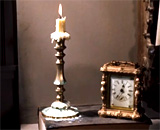
|
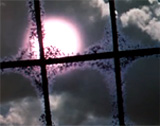
|

|
|
Changes in Time Reflected in Stop-Motion (or Time-Lapse)
|
- as he went faster and pushed the lever further ahead,
he noticed other more rapid developments over a series of days
and weeks: the mannequin in the store window across the street
changed styles and fashions (in voice-over): "I began to grow very
fond of that mannequin. Maybe because, like me, she didn't age"
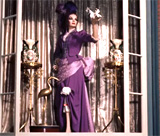
|
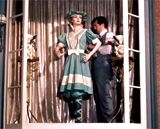
|
|
Mannequin Changing Dress Styles and Fashions in
Storefront Window
|
- in the year 1917 (September), things drastically
changed as the greenhouse windows were abruptly boarded up and
it turned dark: ("Suddenly the light was gone"); George exited
the time machine and noticed that in his adjoining house, the furnishings
were covered and it was very dusty and full of cobwebs; outside,
the exterior of the closed-up house was unkempt and overgrown with
weeds, and it was fenced off with PRIVATE PROPERTY-KEEP OUT signs;
out on the street, he mistook son James Filby (also Alan Young)
for his father David; James informed him that his father had died
in the war a year earlier; he also learned that "the inventor chap"
from across the street disappeared "around the turn of the century,"
and that war had been raging between Britain and Germany since
1914; David had been the executor of the inventor's estate, but
had refused to liquidate it - believing that the owner would eventually return
- George returned to his house, removed the boards
from the greenhouse windows, reseated himself, and proceeded further
into the future; his next time-travel stop was in 1940 - due to
an exploding bomb nearby; upset that another war was occurring,
("The war with Germany was still waging. Now in the air with flying
machines. Then I realized the truth of the matter. This was a new
war"), the disillusioned traveler decided to proceed further, and
about the year 1942, his house was hit, flames shot up, and his
home was "gone in an instant" - and he found himself in the open
air
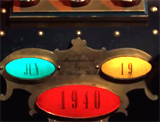
June 19, 1940
|

In 1942, His House "Gone In an Instant"
|
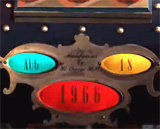
August 18, 1966
|
- due to sounds of strange sirens and other
loud noises, the traveler stopped his machine on August 18, 1966,
and found himself in an open garden park area; he watched as people
were hastily departing from their parked cars and running toward
a nearby underground air-raid shelters for safety; he noticed a
plaque erected in the park where his sundial had been positioned:
"THIS PARK IS DEDICATED BY JAMES FILBY TO HIS FATHER'S
DEVOTION FOR HIS FRIEND, GEORGE"; outside the Filby's Department
Store, George noticed an elderly James in his mid-60s, one of the
Civil Defence Wardens dressed in a silver plastic suit with white
helmet, who was scurrying toward the shelter to take cover: ("We'd
better be going before the mushrooms start sprouting"); although
Filby remembered speaking to him in 1917, he then thought it had
to be very unlikely: "That's impossible! You haven't changed. You're
not a day older"; ignoring George's questions, he fled when he
observed up in the sky: "An atomic satellite zeroing in!"
- George was thrown to the ground by shockwaves from
a blinding flash, followed by an explosion and a giant mushroom
cloud on the horizon; the atomic blast destroyed the once-beautiful
city, and molten lava flowed through the streets; George thought to himself (voice-over):
"The labor of centuries, gone in an instant"; the bomb set off
volcanic explosions and a massive, red-hot lava flow: ("Mother
Earth, aroused by man's violence, responded with volcanic violence
of her own. Only my speed through time saved me from being roasted
alive and encased in stone forever"); he had no choice but to rush
to his time-traveling machine and escape into the future
- as he traveled onward through centuries of time,
he prayed to be saved: ("I prayed, wondering how many centuries,
how many eons must pass before the wind and rain could wear away
the mountain that enclosed me"); he lit a march in the darkness
to see the control panel spinning and passing through many hundreds
of years ("I put my trust in time and waited for
the rock to wear down around me"); suddenly, the rock was finally
worn away, and blue sky with a lush landscape surrounded him; he
declared: "I was free again"; he asked himself: "Thousands of centuries
had passed, but the Earth had stayed green! There was no winter!
No wars! Had man finally learned to control both the elements and
himself? I had to stop and find out"
- he had hurtled toward October
12, 802701; when he finally pulled the lever back too sharply, his
time machine began to wildly spin and capsize, and he was tossed
onto the ground; he noticed he had tumbled down in front of
large metal doors - the base of a temple with a Sphinx-like head;
he wandered into a magnificent green garden area with flowers (and
devoid of weeds or briars); he was overjoyed: "Trees and vines
laden with fruits of strange shapes and colors. Nature tamed completely,
and more bountiful than ever before! At last, I'd found a paradise"
- but he wondered if he was all alone: ("But it would be no
paradise if it belonged to me alone")
- he came across the gigantic ruins of a weathered
and broken-down large structure with two sphinx statues on either
side of a large flight of concrete stairs: ("Unrepaired for
centuries! Maybe unlived in for as long"); inside were low
tables (without seats but cushions for sitting on the floor) with
white metal place-settings and centerpieces of exotic fruit; he
called out: "Anybody here?"
and his voice echoed; outside, as he continued to wander about
apprehensively, he began to hear human voices, splashing water
and laughter; he found people of the utopian future (youthful,
carefree, and innocent-looking barefooted men and women in
thin pastel-colored robes) who were swimming, sunbathing, romping,
and playing in the sunshine:
"So this is man's future, to bask in the sunlight, bathe
in the clear streams and eat the fruits of earth with all knowledge
of work and hardship forgotten"
- suddenly, he heard screams from one of the drowning
girls in the rough current, while other indifferent individuals
looked on and completely ignored her plight or came to her rescue;
when no one responded to his calls: "HELP HER!", George
dived into the water and saved her; however, she didn't respond
when he asked:
"Are you alright?"; she appeared bewildered, unemotional,
and lacking either gratitude or fear for being rescued; he couldn't
understand why no one acknowledged his presence

Upon Arrival, the Time Machine Wildly Spun and Tossed Him to the Ground
|
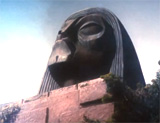
A Sphinx-Like Statue Atop a Temple Structure
|
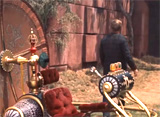
The Time Machine Outside Large Black Metal Temple Doors
|
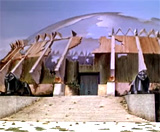
Giant Structure - In Disrepair
|
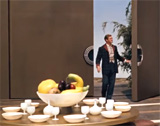
Inside the Great Hall Were Low Tables Laden With
Fruit
|
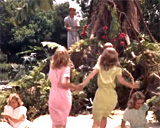
First View of the People of the Future by Water's Edge
|
- afterwards, George watched as the oblivious young
people in their multi-colored robes ran over to the
Great Hall and entered; he was astonished and perplexed that they
were completely uninterested in him, except for the girl
he had saved; she came over to him on the steps and asked: "Why
did you...come after me?"; to his surprise, she was also apathetic
about his rescue of her, like the others, causing him to wonder:
"That's a very curious attitude - a very curious world"; after
he followed up: "Aren't you interested in who I am? Where I come
from?", she answered: "Should I be?"; when he asked to speak to
someone older, she replied: "There is no one older" - and he realized
everyone was the same age; she gave him her name Weena (Yvette
Mimieux), and the name of her race of small and delicate young
people (known as the Eloi); he spelled the two words out in the
dust of the steps; she was fearful of the dark and led him inside the Great Hall
- through further questioning of Weena and the others,
George realized that the Eloi were illiterate, emotionless, didn't
value life, lacked inquisitiveness about life or learning, and
had no government or set of laws; they also didn't work, and were
somehow provided with their clothing and food; he expressed his
interest in finding out her civilization and asked: "Do you have
books?" and one of the young men answered affirmatively
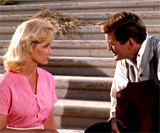
"Why did you...come after me?" - Naive and Childlike
Weena (Yvette Mimieux)
|
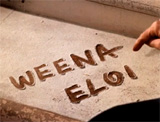
He Spelled Out Her Name and Her Race
|
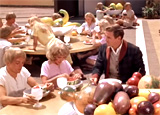
Inside the Great Hall, Asking Questions of the Eloi
|
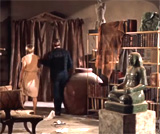
The Dusty, Neglected Library
|
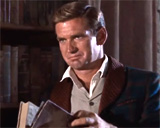
Crumbling Pages of a Book in His Hands
|
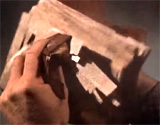
The Entire Library Filled With Books That Had Completely Deteriorated
|
|
The Eloi - A 'Heavenly' Utopian Society of
Emotionless Hedonism, Complete Ignorance, and Cruel Slavery
|
- he was led to a musty old library with shelves and
shelves of books covered by dusty curtains; when he pulled one
of the volumes from a shelf, the pages (and then the entire book)
crumbled into ashes in his hands and fell to the floor; he reacted
with rage for the disrespect and neglect shown to the books, and
chastized the confused and apathetic lad for the utter lack of
concern shown for the creation of historical works over thousands
of years: "What have you done? Thousands of years of building and
rebuilding, creating and re-creating so you can let it crumble
to dust! A million years of sensitive men dying for their dreams.
For what?! So you can swim and dance and play!"
- George strode back into the Great Hall and announced
his utter frustration with their society: "I'm going back to my
own time! I won't even bother to tell of the useless struggle,
the hopeless future, but at least I can die among men!"; he marched
back to his time machine, but was stunned that it was missing;
parallel tracks (with half-human footprints next to them revealed
it had been dragged inside the temple's locked doors; he also noticed
some pale, indistinct figures observing and spying on him behind some bushes
- Weena had followed him, to inform him that he was
unable to open the metal doors: "No one opens it. Only the Morlocks";
he learned that she was clearly frightened of the underground-dwelling
Morlocks whom they were forced to obey, when she told him: "They
give us the food we eat and the clothes we wear. We must obey their
command"; he commented on her childlike nature for being fearful
of the dark - presumably because the Morlocks only came out at night
- he suggested building a fire and await the morning before trying to
enter the doors; as they gathered dry pieces of firewood, he reminisced
about how his house and laboratory stood exactly where they were
now; but he was clearly frustrated with what the future had revealed to him: "I had
hoped to learn such a great deal. I hoped to take back the knowledge
and the advancement that mankind had made. Instead, I find vegetables. The
human race reduced to living vegetables"
- as he spoke to her, she was dragged off screaming
by one of the white-haired Morlock creatures into the bushes, and
he again rescued her; he hoped the fire he had lit would keep them
away; however, she cluelessly reached out into the fire, and he
muttered: "No knowledge of fire. No books, huh"; then,
he apologized for his outburst earlier against her
people in the Great Hall: ("I am sorry I was angry with your people.
I had no right to be"); he recognized in
Weena a possible and daring spirit of self-sacrifice and inquiry:
("And you have that quality. I think all of your people have it,
really. It just needs someone to reawaken it. I should like to
try if you'll let me. Will you?"); she answered: "I do not understand
you, but I believe you"
- when he further asked her about the Morlocks, she
couldn't answer; his questions about the past and future were simply
answered: "There is no past....There is no future"; he was hopeful
that he could rekindle their spark of emotion and interest in life:
"The past, man's past, is mainly a grim struggle for survival.
But there have been moments when a few voices have spoken up. And
these rare moments have made the history of man, man's past, a
glorious thing. I refuse to believe it's dead and gone. We've had
our dark ages before. This is just another one of them. All it
needs is for someone to show you the way out. I'm only a tinkering
mechanic, but I'm sure there must be that hidden spark in one of
your people. If only I can kindle that spark, my coming here will
have some meaning"
- the next morning to find another way to retrieve
his machine, Weena and George surveyed open concrete domed structures
through which ominous sounds of giant throbbing machines emerged;
Weena mentioned learning about the machines and life underground
through "rings that talk"; she led him to a green-walled
ancient museum (down a corridor inside the Great Hall) to demonstrate
the rings, that she said explained "things no one here understands";
by spinning them, recordings briefly told the de-evolving history
of the Earth - marked by continual warfare - (voice of Paul Frees) "The
war between the East and West, which is now in its 326th year,
has at last come to an end....The atmosphere has become so polluted
with deadly germs that it can no longer be breathed. There is no
place on this planet that is immune...Some chose to take refuge
in the great caverns and find a new way of life far below the Earth's
surface. The rest of us decided to take our chances in the sunlight
- small as those chances might be"
- in voice-over, George told what he had learned from
the rings: "From the talking rings, I learned how the human race
divided itself and how the world of the Eloi and the Morlocks began.
By some awful quirk of fate, the Morlocks had become the masters
and the Eloi their servants. The Morlocks maintained them and bred
them like, like cattle, only to take them below when
they reached maturity. Which explained why there were no older
people among them"
- George was determined to enter one of the domed
structures (a well or air shaft) to go below and search for
his time machine; Weena was worried: "You won't come back!," but
he reassured her: "I'll be back"; she gave him a pink
blossom that he put in his pocket; after partially descending,
he heard loud air-raid sirens from the Sphinx-like structure blasting
a deafening noise; he reappeared on the surface and watched as
the Eloi marched expressionless and trance-like from the Great
Hall and other locations straight toward the structure to enter
into the metal gates that were now open; they were being summoned
to their deaths, taking advantage of their instinctual response
to the air-raid sirens to seek underground cover
- frantically,
George searched for Weena but was unable to reach her and save
her before the metal doors closed and locked behind her, when the
sirens subsided: ("It
is all clear");
after persistent questioning, the Eloi could not tell him what
would happen to "the ones who went below"; one
man answered: "They never come back. Nobody can bring them
back"
before everyone calmly dispersed
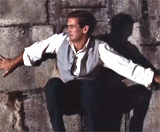
Down the Air Shaft to an Underground Cavern
|
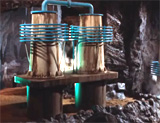
Machines Throbbing Noisily
|
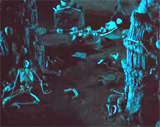
A Feasting Room - Evidence of Cannibalism
|
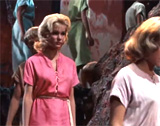
Underground, the Eloi Were Herded Like Cattle
|
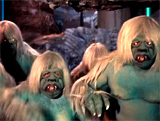
The Hideous Morlocks With Blinking, Glowing Eyes
|
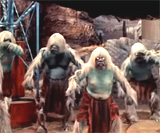
The Morlocks Ready to Attack
|
- he returned to the domed structure and climbed back
down into the rocky shaft to the base floor of an underground cavern;
he constructed a makeshift torch, and then after searching around
and finding throbbing machines, he was dismayed to locate a feasting
room - a depository of human skeletons and remains providing evidence
of carnivorous cannibalism; he reacted (in voice-over); "So
this was the destiny of the Eloi. They were being bred by the Morlocks
who had degenerated into the lowest form of human life"; he
watched as a group of Eloi (including Weena) was forced to march
in single-file by whip-wielding Morlocks (half-human and half-ape
creatures with clawed hands, blinking and glowing eyes, savage
teeth, greenish-blue skin, and long white hair on their heads and
arms)
- he was able to protect the group of Eloi by fending
off the Morlocks with a lit match to blind them; they were fearful
of fire and bright light; he also
fought them off with a burning torch, as he attempted to guide
the Eloi to safety; he also brawled with the monstrous creatures
using his fists before he was able to lead the long line of Eloi
on a rocky stairway-ledge out of the cavern and up the well entrance
to the surface; he encouraged the Eloi to toss piles of dried wood
back into the wells, feeding the flames already burning below,
and causing explosions that collapsed the wells and swallowed up
the entire cave area and obliterated many of the Morlocks
- George described in voice-over the partial victory
he had won to free the Eloi from fear, but that he felt trapped
in their very different world: ("Another night was coming, but
this night, no Eloi needed to fear. The underworld of the Morlocks
was gone and so was the life of leisure for the Eloi. But then
what of me? I was imprisoned in a world in which I just did not
belong"; he explained to Weena that to the people of his own time,
he could tell them "about the sorrow and the happiness that the
future has in store for them. Maybe they could learn from it. Or
could they?"; he assured her that she was his only love: "No one like you"
- as he was telling her - and about to kiss her: "Oh,
Weena, I wish we could go back to my time, or even to the time
before that when the world was young. We could be so very happy....",
they were interrupted by excited Eloi voices, reporting that the
temple's Sphinx-like statue was broken in half and that the metal
doors had opened - revealing his time machine; George raced inside
to prepare to travel back in time, but Weena hesitated too long
and the doors shut behind him; it was revealed to be a trap - he
was briefly attacked by a few Morlocks before he was able to activate
the time machine, and return to January 5, 1900; at first however,
as he watched a dead Morlock deteriorate through time before his
eyes, he realized he was advancing into the future rather than
going back in time, and he corrected himself

George to Weena: "We could be so very happy..."
|
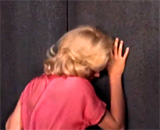
Weena Blocked From Entering the Metal Doors
|
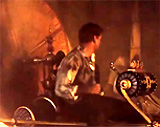
Back in Possession of His Time Machine
|
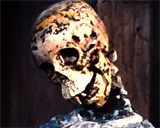
The Dead Morlock Deteriorating In Front of Him
|
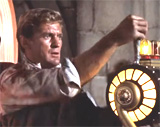
Realizing That He Was Going Forward in Time, Not Backward
|
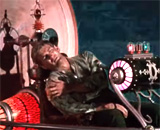
Journeying Back to the Year 1900
|
- due to the different positioning of the time machine
by the Morlocks, George found that when he had arrived home on
January 5, 1900, the mechanism was outside in his garden area;
as he stumbled into his home, the flashback ended, and he was seated
at the dinner table with his guests at 9:20 pm
- his dinner guests were skeptical, calling his tale "preposterous,"
"ridiculous," and "a good yarn"; even George
admitted he could hardly believe what had happened to him: ("Take
it as a lie if you wish. I scarcely believe it myself, now that
I'm back"); to prove the account of his travels, he showed
everyone the still-fresh exotic pink flower that Weena had given
him, but they were still disbelieving and soon left, except possibly
for amateur botanist Filby; as Filby was leaving, George thanked
him for his future faith and dedication in him: "Thanks for being
such a good friend, David. Always"
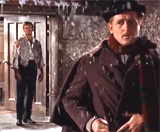
Last Sentimental Goodbye Between David and George
|
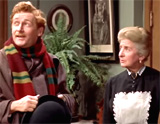
Filby's Epilogue Response to Mrs. Watchett: "He has all the time in the
world"
|
- in the film's speculative epilogue, after briefly
leaving, the concerned Filby returned to the house, but realized
after hearing the start-up noises of the time machine in the greenhouse
that his best friend was taking another time-travel adventure (tracks
of the machine revealed it had been dragged back inside from the
garden); he began to ponder George's fate with housekeeper Mrs.
Watchett: "Weena
was standing here when he last saw her. Right here! The same space
in a different time. So he dragged his heavy machine back in here,
scratching the floor so he could appear outside the Sphinx again
and help the Eloi build a new world. Build a new world for himself.
Right where he left her"
- David speculated that George wouldn't
return "empty-handed to try to rebuild a civilization without
a plan" - and had taken three books with him (noticed missing
from the shelves); when asked if he might return some day: "Mister
Filby, do you think he'll ever return?",
Filby answered (with the film's last line): "One cannot choose
but wonder. You see, he has all the time in the world"
|
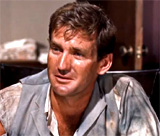
Abrupt Arrival of Disheveled Victorian Idealistic Inventor "George" (Rod Taylor), on Friday,
January 5, 1900
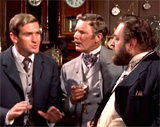
Flashback to Five Days Earlier (December 31, 1899) - Explaining the 4th Dimension
(Time) to His Skeptical Colleagues
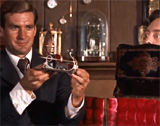
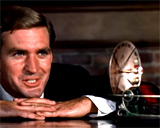
Display of A Miniature Time-Machine in a Box
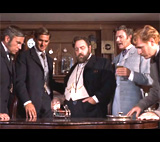
Marveling at the Unveiled Tiny Time-Machine Model

George: "Can man control his destiny?"
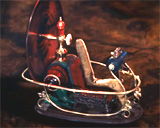
The Activation of the Model - Causing It to Vanish Into the Future
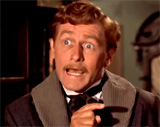
David Filby's Concerns About George's State of Mind : "If
that machine can do what you say it can, destroy it. Destroy it, George,
before it destroys you!"
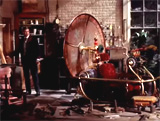
George's Full-Scale Model of a Time Machine in His Laboratory
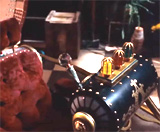
Close-Up of Control Panel and Red Velvet Seat
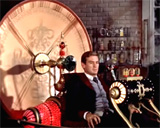
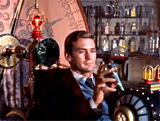
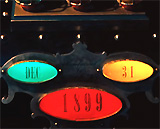
Journey Into Time - From 1899 Into the Future
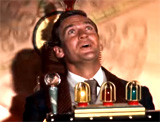
George's Reaction to Time Travel: "It became intoxicating"
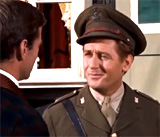
George During a Brief Conversation With James Filby, David's Son in 1917
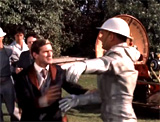
Mid-1966 - People Guided Toward Underground Air Raid Shelters During
Attack
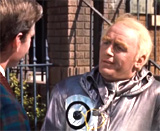
Elderly James Filby, A Civil Defence Warden During Air-Raid Sirens and
Atomic Bomb Attack in 1966
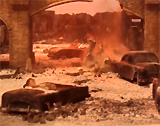
1966 - Result of Atomic Blast ("The labor of centuries, gone in an instant")
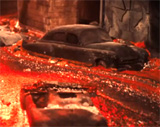
1966 - Volcanic Explosions Followed by Massive Lava Flow
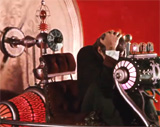
Barely Escaping From Lava Flow in the Time Machine
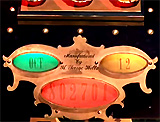
Hurtling
Forward to October 12, 802701 (see nameplate)
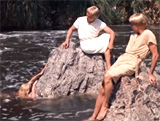
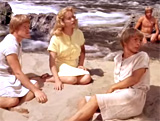
Young Girl Screaming as She Was Drowning, Ignored by Other Onlookers
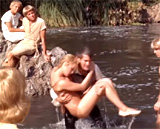
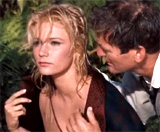
Girl Saved From Drowning, But Strangely Unemotional
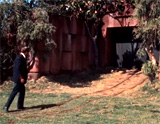
The Stolen Time Machine
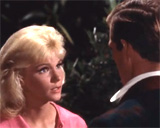
Weena Warning Him About the Dreaded Morlocks
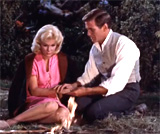
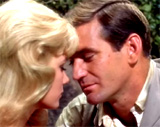
George Hoping to Awaken in Weena (and the Eloi) A Spirit of Self-Sacrifice,
Emotion, Interest in Life and Inquiry - and Romance
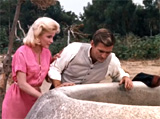
Giant Domed Structures With the Sounds of Underground Machines
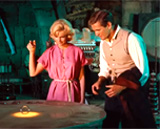
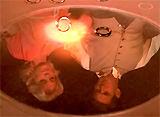
The Spinning, Talking Rings in the Ancient Museum
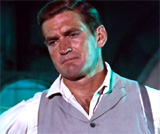
Learning How the World Had Divided Itself Into Two Species
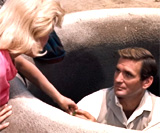
Descending Into One Domed Well or Air Shaft Structure to Find His Stolen
Time Machine

Weena's Trance-Like Walk Toward the Sound of Sirens
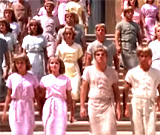
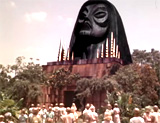
The Death Siren - Summoning the Eloi from the Great Hall to Their Deaths
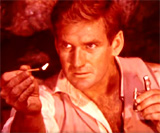
Fending Off the Underground Morlocks With Lit Matches, Producing Blinding
Flashes of Light
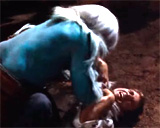
Heroically Fighting Against the Morlocks
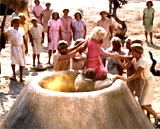
Escaping to the Surface With The Now-Freed Eloi

Return to the Year 1900 - The Time Machine Now Positioned in George's
Garden
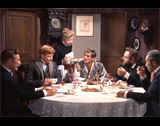
Disbelief at the January 5, 1900 Dinner Gathering
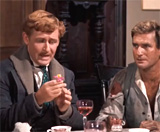
David Marveling at the Pink Flower Gifted by Weena
|












































